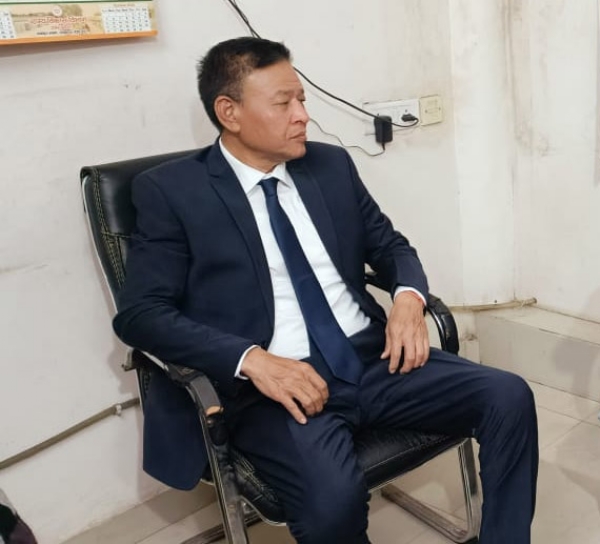
Lucknow,
24 Nov (HS): President of the Tibetan government-in-exile (Central Tibetan
Administration-CTA), Pempa Tsering, has appealed to the world to save his
country's existence. Pempa is traveling around the world to garner support to
save Tibet and the rights and culture of the Tibetan people from the clutches
of China. In this connection, he is currently on a visit to Lucknow, the
capital of Uttar Pradesh. Here, he met officials of various organizations and
told them about the suffering of Tibet and its people. He says that if the
people of the world do not raise their voice, China will destroy the very
existence of the beautiful country Tibet.
On
Monday, President of Tibetan Government in Exile, Pempa Tsering reached the
office of Hindustan Samachar multilingual news agency in Lucknow. Here,
President Pempa discussed in detail with Hindustan Samachar about the current
situation and problems-challenges of Tibet. Before this, he also visited the
office of Akhil Bharatiya Vidyarthi Parishad here. During the discussion, on
the question of the purpose of his visit, President of Central Tibetan
Administration-CTA, Pempa Tsering said that he is going not only to India but
to all the countries of the world. His only aim is to liberate Tibet from the
Chinese clutches and restore its original culture and human rights of the
people there. He said that now the world has started understanding the pain of
Tibet.
How
China is destroying Tibet's existence: Responding to this question, President
Pempa Tsering of the Central Tibetan Administration (CTA) stated that for at
least eight decades, the Chinese administration has been using all kinds of
tactics to control Tibet and destroy its fundamental existence. The most tragic
thing is that the Chinese administration has completely destroyed the human
rights of the Tibetan people, restricting their religious freedom, and
virtually eliminating the activities of religious sites. Consequently, Tibetans
cannot freely conduct their religious activities. The Chinese have almost
completely destroyed Tibetan language, religion, culture, and traditions.
How
is the Chinese administration treating the young students of Tibet? Getting
emotional on this question, President Tsering of the Central Tibetan
Administration (CTA) said that the future generation of Tibet is being
completely separated from Tibet so that they will not be able to raise their
voice for their country Tibet in the future. Tibetan children, students and
youth are being adapted to Chinese culture. Separate schools and hostels are
being built for them, where they have no connection with Tibetan culture. The
youth are being made loyal to the Chinese government and their lives are being
filled with Chinese culture.
What
development is China doing in Tibet? Responding to this question, President Tsering
said that China is telling the world about Tibet's development, but the reality
is brutal and painful for the Tibetan people. China has completely altered
Tibet's demographic and geographical landscape. It is building large dams,
including those that are not ecologically compatible, and Tibet's environment
is being polluted and destroyed.
What
is the world's view of Tibet? Tsering explained that China has been spreading
propaganda around the world claiming Tibet belongs to them and is therefore
developing it, but this is not the truth. The truth is that Tibet is our
country and we should get it. The world is well aware of China's imperialist
policies and that the Chinese system, through its power and strategic
maneuvers, has entrapped all the countries of the world.
What
kind of support do you want in this fight? President Tshering stated, Our
entire movement is based on non-violence. Under the guidance of His Holiness
the Dalai Lama, we are fighting to preserve the existence of our beloved
nation, Tibet. We urge the world, including India, to support us in a
nonviolent manner and openly oppose China's expansionist policies. Raise your
voice in support of Tibet.
What
attitude do you find of the Chinese government towards its neighboring
countries?
Tsering
became very serious on this question. He said that China has trapped all its
neighboring countries in its web. He cited examples from Sri Lanka, Pakistan,
and even Nepal, demonstrating how China has lured them into its trap by
providing loans and then exploiting them. China interferes in the domestic
affairs of neighbouring countries and takes control of their administrative
systems. He also expressed surprise that many neighboring countries remain
ignorant despite knowing about China's expansionist policies.
What
is India's role in maintaining Tibet's autonomy? He said that the Indian
government and its people mean a lot to Tibet. Without them, the movement's
journey so far would not have been possible. Therefore, the Central Tibetan
Administration (CTA) expresses its gratitude. He added that India is acting in
accordance with its foreign policy on the Tibet issue and is with us on many
fronts. He added that India and Tibet share a common cultural heritage and that
India plays a significant role in Tibet's survival.
How
big a threat is China to India? On this, he said that China has completely
failed on its domestic front, but it has focused the world's attention on
international issues and is beginning to see itself as a decisive player. It
has built several disputed structures on India's border. It is also trying to
encircle India militarily. The Galwan Valley incident and Chinese incursions
demonstrate this. However, India has also undertaken significant development
work in its border areas and has significantly developed its military
capabilities. India should continue this.
Would
you like to say something on India-China trade? Responding to the query, he
remarked, “India-China trade depends on the needs of both countries, but in my
opinion, India should increase its own self-reliance, as Chinese products are
still coming to India in large quantities, and this will create an economic
imbalance, which will be unfavourable for India. Therefore, entrepreneurs and
the government here should make concrete efforts in this direction.”
Hindusthan Samachar / Abhishek Awasthi







